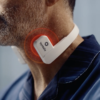A large-scale study completed by Scotland’s University of St Andrews has determined that biomarker testing in blood samples, among subjects at risk for contracting lung cancer, can save lives. Over 4,000 Scottish people are diagnosed with the disease every year.
For their analysis, the institution’s researchers examined 12,000 smokers and former smokers between the ages of 50 and 75. By testing these high-risk individuals with the “EarlyCDT-Lung” test for particular biomarkers linked to lung cancer, they claim to have been able to reduce the number of deaths within the group by 40 per cent over five years.
“Biomarkers are measurable indicators of biological processes, such as proteins or other substances found in blood or urine,” the school explained in a news release on Thursday. “These markers can signal changes in the body that may indicate disease, including cancer, even before symptoms appear.”
Getting screened is a smart choice
As lung cancer is the deadliest of the disease group, and the survival rate among diagnoses is slim unless it is detected very early, this new research provides hope. Whether you are a smoker or not, and regardless of whether you’re in shape or overweight, getting screened for lung cancer is a wise idea.
“The trial provides proof of concept and clinical utility that blood testing in combination with optimal selection of high-risk people and imaging can find cancers at the earliest stages when they are most amenable to cure,” the study authors concluded in their PLOS One journal entry.
A professor from the university’s School of Medicine, Dr. Frank Sullivan, told Britain’s PA Media that this testing method may serve as an efficacious preliminary screening option before low-dose CT scans.
“The low-dose CT scan over-diagnoses, the blood test misses cancers, whereas if you combine the high sensitivity of one and the high specificity of the other, that might make it a viable option,” he said.
Read more: Breath Diagnostics onboards new president and closes critical financing
Read more: Breath Diagnostics pioneers novel lung cancer breath test
Blood biopsies gain popularity elsewhere
One particular United Kingdom-based company, Cizzle Biotechnology Holdings PLC (LON: CIZ), has been developing and commercializing a similar test. Cizzle’s liquid biopsy works by identifying a biomarker variant of a particular protein in a subject’s blood, which is known to be linked to early-stage lung cancer.
Another, Oxford Cancer Analytics, just raised US$11 million to propel the development of its proprietary lung cancer blood test.
Certain oncology companies in Canada and the United States have been pioneering the usage of blood testing to detect the respiratory condition in its early stages too.
Grail Inc (NASDAQ: GRAL) has created a blood biopsy test specifically tailored to determine which patients will need post-therapy surgery the most. This company is also the developer of the increasingly popular “Galleri” multi-cancer early detection (MCED) blood test that can detect multiple cancers.
And in New Brunswick, the provincial government recently started employing the testing method for patients who are too weak to undergo a tissue biopsy or have a tumour in an inconvenient location. This marked the first time that the assessment technique had been employed in the Atlantic Canada provinces of New Brunswick, Newfoundland and Labrador, Nova Scotia and Prince Edward Island.
One of many emerging lung cancer detection measures
Other companies that have been experimenting with the diagnostics method include Resolution Bioscience, Roche Holdings AG Basel ADR Common Stock (OTCMKTS: RHHBY) and DELFI Diagnostics. Breath testing, AI-powered analysis of X-ray imaging and phlegm/spit examination are additional techniques being employed to identify the disease in its early stages.
One particular American company, Breath Diagnostics Inc., recently made a significant breakthrough in the lung cancer testing field with the invention of its patented OneBreath MicroReactor device. It is a minimally-invasive, radiation-free respiratory diagnostics tool.
With this testing system, patients simply need to breathe into a bag that then gets sent off to a lab for analysis in a timely manner. This technology has demonstrated efficacy in more than 800 patients at three clinical sites. One of the company’s founders, Victor van Berkel, is one of the most highly respected lung transplant surgeons in the world.
Breath Diagnostics recently closed a US$1-million-dollar convertible note financing led by a team of strategic investors to propel development and commercialization of the device before eventual FDA approval.
rowan@mugglehead.com














